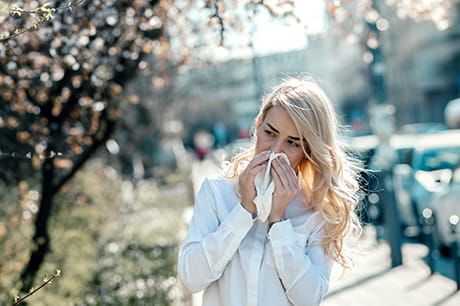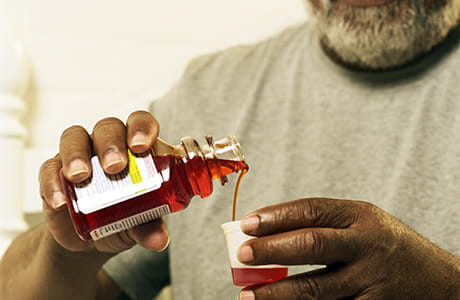How to find the right treatment for seasonal allergies
When it comes to seasonal allergies, there are multiple treatment options. Find one that works best for you.
Whether it's warmer summer or cooler fall weather, pesky seasonal allergies often follow. Sneezing, itchy eyes and coughing hit children and adults alike. Finding a treatment method that works well can bring relief from these allergies — so you can get outside and enjoy the fresh air.
What causes seasonal allergies
Allergies occur when your immune system reacts (or overreacts) to a foreign substance, like pollen, a bee sting or even certain foods. When your body is exposed to something you’re allergic to, it reacts by trying to remove the allergen from your system. These reactions often cause allergy symptoms that can include:
- Sneezing
- Itchiness
- Coughing
- Runny nose
- Hives
- Swelling
- Anaphylaxis (a severe, potentially life-threatening allergic reaction)
“For most people, seasonal allergies cause mild symptoms like sneezing and runny nose,” says Joseph Lobrutto, PharmD, pharmacy manager at Geisinger Community Medical Center. But for some, symptoms can be life-threatening. In those cases, an EpiPen is often the best form of treatment.
“In general, however, allergy medications or treatments like shots or drops can help lessen the effects of allergens,” says Lobrutto.
Allergy medicine to manage your symptoms
Using medications like antihistamines, decongestants, steroidal nasal sprays and eye drops — either together or separately — can help you reduce and manage your symptoms.
“Antihistamines are over-the-counter medications that reduce your body’s allergic response,” said Lobrutto. “But they can cause drowsiness, so be sure you know how the medication affects you before operating any heavy machinery, including driving your car.”
Decongestants are another over-the-counter medication that work by breaking up mucus and congestion. “While you can buy these at your local store, more effective decongestants like pseudoephedrine (Sudafed) are only available at a pharmacy,” says Lobrutto. He cautions against using decongestants for more than 3 days at a time without talking to your doctor or pharmacist.
Steroidal nasal sprays help you breathe easier by reducing inflammation in your nose. Most allergy nasal sprays are available over the counter and are usually used for one to two sprays per day, per nostril.
“Steroid nasal sprays are not the same as decongestant nasal sprays, as they can be used longer than decongestants,” says Lobrutto. There are also antihistamine nasal sprays available, but you’ll need a prescription from your physician for these.
Eye drops control the itchiness and watering that come with seasonal allergies. Some of these drops are available over the counter and others through a prescription from your doctor. For the best results, remember to take out contact lenses before using your eye drops.
Seasonal allergy treatment options
Beyond these medications that just treat the symptoms, you may also want to talk with your doctor about other allergy treatment options such as allergy shots.
“Allergies can be treated by exposing your body to a small and increasing amount of what you’re allergic to,” says Lobrutto. This means that, as you continue receiving allergy treatments, the amount of allergens you’re exposed to increases each time.
Your body gradually builds up tolerance against what you’re allergic to — and that lessens your symptoms.
“Talk with your doctor or pharmacist about your seasonal allergy, symptoms and which treatments or medications might work best for you,” says Lobrutto.
Next steps:
Did you know Geisinger has a pharmacy? Click here to save $5 on your next prescription.
Kids with allergies? Here's why they don't need to be cooped up indoors.
Is it a cold, flu, allergies or COVID-19?





